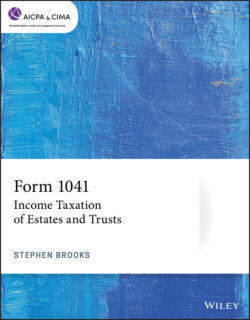Читать книгу Form 1041 - Stephen Brooks - Страница 44
На сайте Литреса книга снята с продажи.
Definitions
ОглавлениеTestator — A person who has made a will; esp., a person who dies leaving a will.60
Devise — To give (property) by will.61
Bequest — (1) The act of giving property (usually personal property) by will; (2) Property (usually personal property other than money) disposed of in a will.62
Executor (or Executrix) — (1) One who performs or carries out some act; (2) A person named by a testator to carry out the provisions in the testator's will.63
Intestacy — The state or condition of a person having died without a valid will.64
Personal effects — Items of a personal character, especially personal property owned by a decedent at the time of death.65
Administrator — A person appointed by the court to manage the assets and liabilities of an intestate decedent.66
Residue — The part of a decedent's estate remaining after payment of all debts, expenses, statutory claims, taxes, and testamentary gifts (special, general, and demonstrative) have been made.67
Specific gift — A bequest of a specific or unique item of property, such as any real estate or a particular piece of furniture.68
General gift — (1) A bequest of a general benefit, rather than a particular asset, such as a gift of money or a gift of all the testator's stocks; (2) A bequest payable out of the general assets of the estate.69
Probate assets — A decedent's asset that by law is subject to the claims of creditors or legacies.70
Nonprobate assets — Property that passes to a named beneficiary upon the owner's death according to the terms of some contract or arrangement other than a will. Such an asset is not a part of the probate estate and is not ordinarily subject to the probate court's jurisdiction (and fees), although it is part of the taxable estate. Examples include life-insurance contracts, joint property arrangements with right of survivorship, pay-on-death bank accounts, and inter vivos trusts.71
